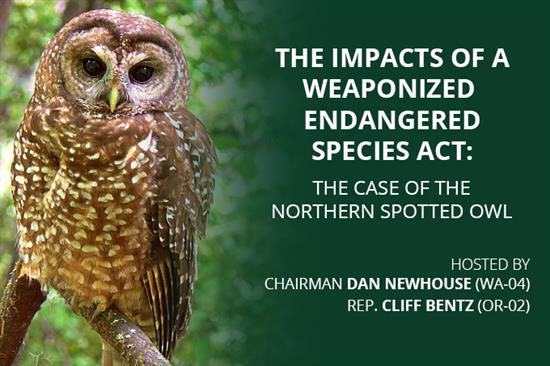Newhouse, Bentz Host Virtual Forum to Highlight Mismanagement of the Northern Spotted Owl“Impacts of a Weaponized Endangered Species Act: The Case of the Northern Spotted Owl”
Washington,
June 16, 2021
|
Elizabeth Daniels
(202-280-8720)
WASHINGTON, D.C. – Chairman Dan Newhouse (WA-04) and Rep. Cliff Bentz (OR-02), Ranking Member of the House Natural Resources Subcommittee on Water, Oceans, and Wildlife, hosted a virtual forum titled, “The Impacts of a Weaponized Endangered Species Act: The Case of the Northern Spotted Owl,” to highlight the mismanagement of the Northern Spotted Owl in the Pacific Northwest.
The forum featured three panelists who spoke on the impacts of the protections and restrictions imposed by the Endangered Species Act (ESA):
“Local communities and states know better than anyone how to take care of their local lands and native species, and they have a vested interest in seeing their local environments and economies thrive,” said Rep. Bentz. “I can’t think of anything more important than drawing to the nation’s attention the incredible risk the western United States is facing by virtue of the huge accumulation of wood, which in large part can be put at the feet of the bad approach to saving the spotted owl.” “This really is a story of 30 years of not making it better for the spotted owl, but we have 30 years of making it worse for everything else,” said Commissioner Freeman. “Everything from the chance to recreate on these lands, the health of the forest, and the communities these forests surround are all worse because of the Endangered Species Act and the listing of the spotted owl.” “The heavy and unintended consequences [of the spotted owl listing] that were handed down by unelected agencies did irreparable harm to the unattended forests that burned with such high intensity it destroyed the very habitat intended for protection. It did harm to communities where family wage jobs once were created… It did harm to the hydraulic functions of the national forests,” said Commissioner Nash. “The greatest loss though has been the skip in a generation of young people with firsthand knowledge of stewardship of these lands.” “It would take 40 years of timber harvest activities on federal lands across the Pacific Northwest to impact the amount of spotted owl habitat lost to wildfire in Oregon just last year,” said Mr. Heikkila. “Our current approach to not managing these forests is losing. We really need to see the forests from the trees and understand that doing what’s right for the forest will be good for the owl.” The northern spotted owl was listed as “threatened” under the Endangered Species Act (ESA), which included a designation of 6.8 million acres as critical habitat for the species. In 2012, the U.S. Fish and Wildlife Service (FWS) designated 9.5 million additional acres as critical habitat, including millions of acres of federal land that are not critical habitat for the owl. The Trump Administration finalized a rule revising the the designation of critical habitat, excluding 3.5 million acres in Washington, Oregon, and California and maintaining 6.8 million acres of critical habitat on federal land in line with the best available science. Earlier this year, the Biden FWS announced the delay of the implementation of this revised rule with the intent to revise or withdraw the policy. Rep. Bentz (OR-02) led a letter urging the Administration to immediately implement the revised rule in order to adhere to the intent of the ESA, lessen the negative impacts on rural communities, and improve recovery of the species. Read more about Rep. Bentz’s leadership in the Medford Mail Tribune. |
Stay Connected
Use the following link to sign up for our newsletter and get the latest news and updates directly to your inbox.


